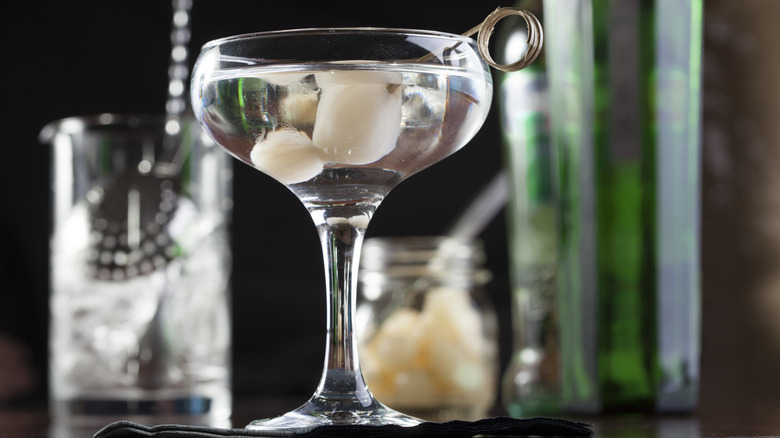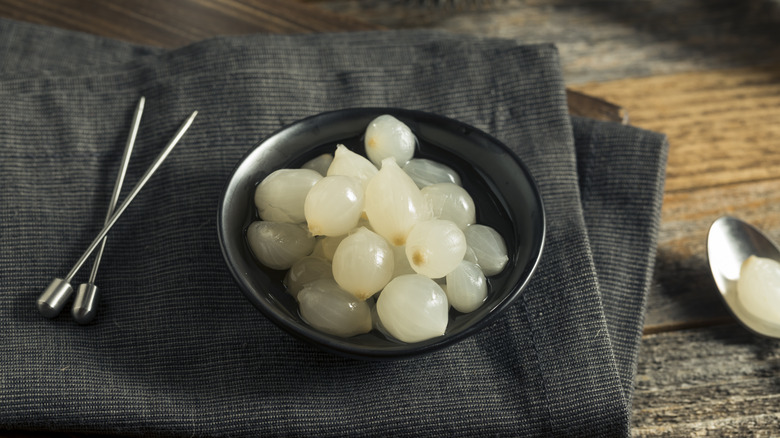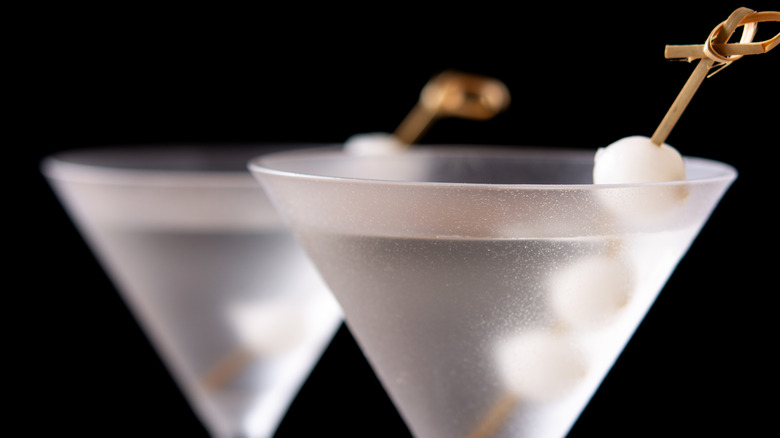What Is A Gibson Cocktail And Why Isn't It Called A Martini?
No cocktail exudes elegance and sophistication quite like the martini. Sure, this is partly due to the cocktail's association with the dapper James Bond, but a classic martini is also a no-nonsense, no-frills drink — one in which the liquor is bold, the temperature is icy, and the glass is sexy. But the martini does have a fraternal twin, so to speak, one which has an equally urbane reputation, is mostly made of the same elements, but is still as different as night and day in the cocktail world. This, of course, is the Gibson.
The Gibson is exactly the same thing as a gin martini, save for the garnish. Both are made with gin and dry vermouth, but instead of the classic olive or lemon twist that accompanies a martini, a Gibson is garnished with cocktail onions. It's this one detail that distinguishes it from all other types of martinis and allows the drink to be christened with its own name. Because vodka martinis have gained such a large fanbase and are many people's preferred spirit for martinis, it also can be used in place of the gin in a Gibson. But the vermouth must remain dry and the onion is non-negotiable.
A brief history of the Gibson
There are several tales as to who is responsible for creating the Gibson, but a solid story is undetermined. The very first printed mention of the drink came from "The World's Drinks and How to Mix Them," which was initially published in 1908. However, what sets it apart in this book is not the inclusion of an onion garnish, but its lack of bitters which was a popular addition to martinis around the turn of the century. In essence, the Gibson was gin and dry vermouth according to this publication.
The Gibson origin theory many regard as well-founded suggests that the drink as we know it today was developed by Walter D.K. Gibson at the end of the 19th century at the Bohemian Club in San Francisco. Apparently, the businessman believed that onions prevented the common cold. Gibson's great-nephew claims that his relative preferred Plymouth gin and liked to twist an orange peel above the glass to impart a faint bit of the citrus oil into the drink, according to The Spruce Eats.
Like traditional martinis, a premium gin or vodka is the best choice for a Gibson since the cocktail will not mask the flavors of the spirit. A single or three cocktail onions on a cocktail pick should garnish the drink (based on the same superstition that is aligned with martini olives). The onions aren't just for looks (or for unproven virus prevention), but they also impart a delicious umami, onion essence.
There is no other cocktail quite like the Gibson
The Gibson is unique in that, arguably, no other cocktail is as closely associated with its garnish. The Vesper martini is always garnished with a lemon twist and an orange slice or twist is a must for a negroni, but these fruits are also used to garnish a number of cocktails. You'll be hard-pressed to find another drink that calls for an onion garnish other than a Gibson. Bloody Mary's occasionally include them, but it's certainly not a necessity.
With this being said, if you purchase a jar or make your own batch of cocktail onions, they will probably stay in your refrigerator longer than the box of baking soda you forgot about (ironically, to absorb the smell of onions). If you're not using them for a vast number of Gibson's, cocktail onions make a great addition to charcuterie boards, are a delicious accompaniment to pâté spreads, and add some tang to potato salad. You can also consider combining your martini garnishes for something totally different: skewer an olive, an onion, and perhaps a cornichon, and see what you think. Go ahead and name it after yourself; after all, Gibson did.



